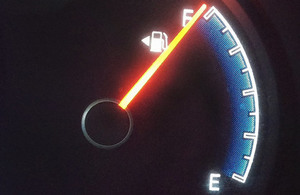£38 million fund will use F1 technology to design greener cars
Winners of government competition will develop ideas to cut vehicle emissions and help plug-in cars drive further.

Formula 1 (F1) technology could soon make family cars lighter, improve fuel efficiency and help plug-in vehicles go further - after an innovative research project won a share of a £38.2 million government prize.
The project is one of more than 130 car manufacturers, technology companies and research centres across the country to have won a share of the money, announced in the Budget, which will create hi-tech jobs and help Britain become a global leader in exporting state of the art, emission-cutting technology.
A consortium including Jaguar Land Rover and Nissan has received £1.7 million for ‘light weighting’ technology - applying the science behind F1 cars and space satellites to make passenger cars weigh less and be more fuel efficient. The results could reduce the weight of steel components in vehicles such as the Nissan Leaf by more than half, potentially extending the distance a plug-in car can drive by up to 25%.
Transport Minister Andrew Jones said:
Our £38 million investment will help Britain become a world leader in this exciting and valuable technology sector, creating skilled jobs of the future as part of our long-term economic plan. It will also mean lower running costs for motorists and less fuel consumption, which is good for the environment and our economy.
This competition continues our £600 million commitment by 2020 to support the uptake of ultra-low emission vehicles, making journeys cheaper and greener, ensuring the nation is fit for the future.
The winning projects were chosen following a competition launched last September (2015) encouraging companies to propose innovative ideas to cut vehicle emissions. The funding combines £30 million from the Office for Low Emission Vehicles (OLEV) with £8.2 million of additional funding from Innovate UK, who will support the schemes.
They will begin unveiling working prototypes by 2018 and could feature in passenger cars from 2020.
Roland Meister, Head of Transport at Innovate UK said:
UK businesses have a great opportunity to be at the leading edge of the global drive to increase efficiency and reduce emissions from our vehicles. This £38 million of government support means that more than 130 innovative organisations right across the country now have the chance to get their ideas off the drawing board and potentially into the cars and trucks of the future, boosting the economy by at least £532 million in the process.
The OLEV research and development fund will award funding to over 130 companies and research organisations across the UK including:
West Midlands
£7.6 million for 36 organisations across the region, including £1.7 million for a consortium led by Jaguar Land Rover and Nissan to develop ways of manufacturing composite materials making vehicles lighter and more fuel efficient. International manufacturers currently pay a premium for light-weight materials - such as carbon fibre found in F1 cars – and this investment will support the mass production of an emerging technology that can boost British-made exports across the globe.
Yorkshire and the Humber
£4.4 million across 12 organisations. Sheffield-based Faradion Ltd lead a consortium receiving £1.3 million to significantly reduce the cost of electric vehicle batteries by using cheaper sodium-ion technology, while a collaboration between Magnomatics Ltd and the University of Sheffield will develop a more efficient transmission system using magnets.
South-east
£5.6 million across 20 organisations. Ceres Power Ltd in Horsham lead a team receiving £770,000 to test new fuel cells extending the range of electric vans.
East Midlands
£7.5 million across 23 organisations. One consortia led by Far-UK in Nottingham is awarded £1.4 million to explore how to replace steel bodies with lighter materials while maintaining the highest safety standards.
Scotland
£2.5 million across 7 organisations. Sunamp Ltd near Edinburgh lead a team to transform chilled or frozen food fleets using ‘thermal store’ technology to minimise battery power used up to keep food deliveries fresh.
North-west
£1.7 million across 7 organisations. A team including Clean Air Power Ltd in Lancashire will seek to apply greener dual-fuel technology to HGVs, cutting emissions on freight deliveries.
East of England
£2.9 million across 15 organisations. Controlled Power Technologies Ltd in Essex leads a consortium of 4 winning £1.8 million to develop a low-cost hybrid system suitable for capturing braking energy and providing an extra boost to smaller city cars.
Greater London
£2.2 million across 11 organisations. Advanced Design Technology Ltd will lead a project team to develop thermal recovery kits that capture waste heat from the exhaust and turn it into electricity.
South-west
£3.1 million across 16 organisations. HiETA Technologies get £1.7 million to lead a project developing new lighter vehicle components made from advanced aluminium alloys.
North-east
£570,000 across 5 organisations including the light weighting collaboration with Jaguar Land Rover.
Roads media enquiries
Media enquiries 0300 7777 878
Switchboard 0300 330 3000